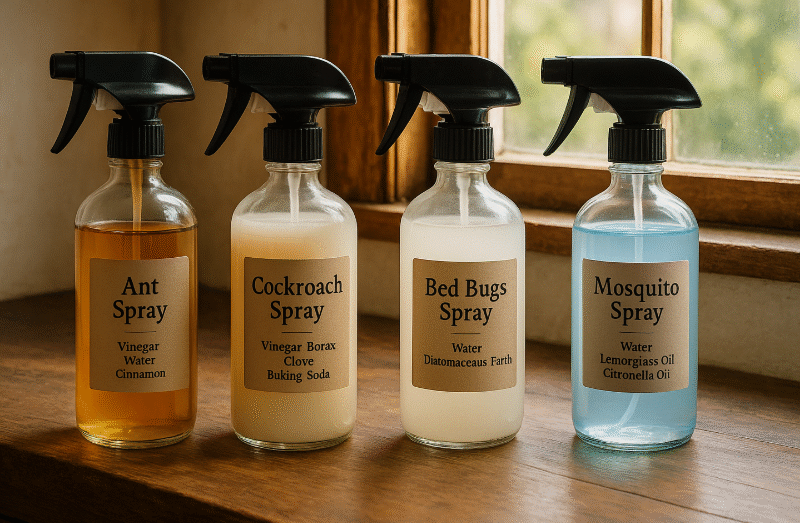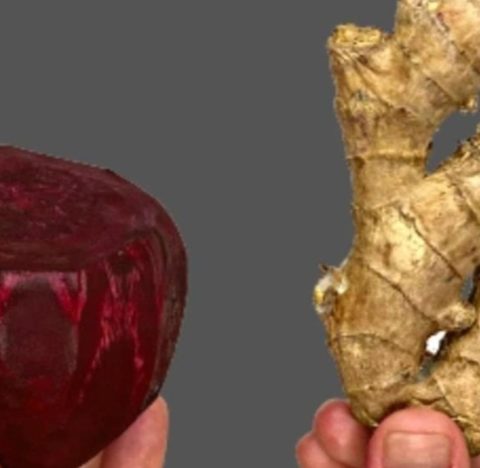4 Homemade Natural Insect Sprays to Safely Banish Ants, Roaches, Bed Bugs & Mosquitoes (No Harsh Chemicals)
Are pests invading your home and driving you crazy? Ants marching across the kitchen, cockroaches scurrying at night, bed bugs leaving itchy bites, or mosquitoes buzzing in your ear can turn your safe haven into a nightmare. You want them gone yesterday, but you’re hesitant to douse your living space with toxic chemicals. The good news is you don’t have to. In this guide, we’ll show you four powerful homemade insect sprays – for ants, cockroaches, bed bugs, and mosquitoes – that use natural ingredients to kick pests out for good. These DIY solutions are simple, effective, and family/pet-friendly. Say goodbye to harsh fumes and hello to a healthier, pest-free home!
By the end of this article, you’ll have easy recipes to make your own natural bug sprays, pro tips from pest-control experts, and a clear understanding of why going green with pest control is better for you and the planet. Let’s reclaim your home using safe, sustainable methods that really work.
Why Choose Natural Insect Sprays Over Chemical Pesticides?
Before we dive into the recipes, let’s talk about why natural sprays are worth a try. Traditional insecticides might promise an instant kill, but they come with a cost to your health and environment. Remember, the “-cide” in pesticide means “to kill,” and those poisons don’t always distinguish between pests and the people or pets you love. In fact, exposure to common indoor pesticides can cause irritation (eyes, nose, throat), damage the nervous system, and even increase the risk of cancer:contentReference[oaicite:0]{index=0}. Every year, thousands of children and pets are accidentally exposed to these toxins:contentReference[oaicite:1]{index=1}, a scary statistic that highlights the dangers lurking under our sinks.
Natural insect sprays, on the other hand, use gentler ingredients like vinegar, essential oils, and plant extracts. They’re free of synthetic fumes and residues, making them a safer choice for your home. When you spritz a DIY ant repellent along your baseboards, you won’t need to evacuate the kids from the kitchen. When you mist a natural mosquito spray on your skin, you’re avoiding DEET and other chemicals that can absorb into your body. **Going natural means fewer worries about respiratory issues, skin irritation, or contaminating your indoor air.** Plus, you can often make these remedies with items you already have, which is easier on your wallet and the planet.
That’s not to say natural solutions are instant magic – they may require a bit more frequent application or a combined approach (we’ll give you pro tips for each situation). But for everyday pest prevention and minor infestations, they can be remarkably effective. In fact, nature has provided us with many potent insect-fighting substances. For example, certain plant oils outperform even commercial repellents: catnip oil’s active ingredient (nepetalactone) has been found to repel mosquitoes more effectively than DEET:contentReference[oaicite:2]{index=2}! With advantages like these, it’s no wonder more people are swapping out toxic sprays for homemade ones.
Ready to take control the natural way? Let’s get into the specific recipes and steps for each type of pest.
Homemade Ant Spray – A Safe DIY Ant Repellent
Ant Problem? You’re not alone. Ants are among the most common home invaders, marching through any tiny crack in search of crumbs and spills. Instead of reaching for a can of commercial ant killer (with its strong odor and residues), you can stop these tiny invaders with a simple kitchen concoction. Our homemade ant spray uses the power of vinegar and peppermint to send ants packing.
- Ingredients: 1 cup white vinegar, 1 cup water, 20 drops peppermint essential oil (optional for extra repellent power), and 1 teaspoon liquid dish soap.
- Purpose: This spray kills ants on contact (thanks to the vinegar and soap) and erases the scent trails they leave for other ants. The peppermint oil acts as a natural ant repellent – ants can’t stand the strong smell.
- How to Use: Combine the ingredients in a clean spray bottle and shake gently. Spritz the mixture directly on visible ants and along their trail or entry points (windowsills, door thresholds, baseboards, etc.). The vinegar-water solution disrupts their pheromone trails, breaking the communication chain that leads more ants into your home:contentReference[oaicite:3]{index=3}. Leave it on for a few minutes, then wipe up the dead ants with a paper towel. You can also spray it on countertops and floors where ants have been seen, then wipe the area clean.
After treatment, you’ll notice fewer ants, and the ones that do wander in won’t find the scent trail to follow. Peppermint oil not only makes your home smell fresh, but it also helps repel ants from coming back. **Pro Tip:** Seal up cracks and crevices around windows, doors, and foundations after spraying. A little caulk or weatherstripping goes a long way – blocking entry points means fewer ants will find their way inside in the first place.
Unlike chemical ant sprays that leave toxic residue, you can use this natural ant spray as often as needed. It’s safe on most surfaces (do avoid spraying directly on delicate natural stone or hardwood finishes – vinegar is acidic – instead, spray a cloth and wipe those surfaces). Always clearly label your spray bottle and store it out of reach of kids and pets. With this DIY solution, you’ll have an ant-free kitchen without worrying about contaminating your food prep areas. And for an extra preventative measure, wipe down your counters daily with a vinegar solution to erase any sugar or food traces that might attract ants.
Looking for another clever way to deal with ants? Some gardeners swear by a banana peel trick that uses boric acid to eliminate entire colonies (yes, really – the banana’s sweetness lures them in, and the boric acid takes them out):contentReference[oaicite:4]{index=4}. That method doubles as a fertilizer for your plants! It’s a great example of how creative you can get with natural pest control. For everyday indoor ant invasions, though, your vinegar and peppermint spray will do the job beautifully.
Homemade Cockroach Spray – Natural Roach Killer and Deterrent
Few household pests are as dreaded as cockroaches. These hardy insects can carry germs, trigger allergies, and make anyone’s skin crawl. If you’ve spotted roaches in your home, you might be tempted to fumigate the place with the strongest chemicals available. But before you do, try this homemade cockroach spray. It’s a two-in-one solution that can knock down roaches on sight and repel others from coming back, all without the harsh chemicals.
- Ingredients: 2 cups water, 1 cup white vinegar, 15 drops peppermint essential oil, 15 drops lavender essential oil, and 1 tablespoon dish soap. (Peppermint is a known roach repellent, and lavender adds an extra punch while helping to mask the vinegar smell.)
- Purpose: This spray aims to kill any roaches you hit directly (soap penetrates their exoskeleton and suffocates them) and repel roaches from the area with residual scent. Vinegar helps with cleaning and may deter roaches from hanging around treated surfaces (though it’s not lethal to them by itself).
- How to Use: Mix all ingredients in a large spray bottle and shake well. When you see a cockroach, spray it liberally – the soapy water can kill it within minutes. Also spray in the cracks, under appliances, under sinks, and along baseboards where roaches like to hide or traverse. The peppermint and lavender oils leave a fragrance that roaches find offensive, encouraging them to avoid those areas.
One of the big advantages here is safety: you can spray kitchen countertops, cabinets, and floors without fear of contaminating your food or dishes (just take care to avoid directly soaking food items). After spraying hiding spots, you might even notice roaches come out (trying to escape the smell), at which point you can give them another direct hit. **Pro Tip:** Cleanliness is key to roach control. Along with spraying, make sure to eliminate food sources that attract roaches. Keep counters crumb-free, store food in sealed containers, and don’t leave dirty dishes overnight. Even the best natural spray won’t keep roaches away if they find a buffet in your kitchen!
For persistent infestations, reapply your spray every few days around problem areas. The scent will fade for our noses but may still be detectable to roaches for a while. You can also boost your roach-fighting strategy with other natural approaches. For instance, placing sachets of dried catnip in cabinets or under the sink can act as a roach repellent – catnip contains nepetalactone, a substance that roaches absolutely hate:contentReference[oaicite:5]{index=5}. Researchers have confirmed that cockroaches are repelled by catnip and even suggested developing catnip-based repellents to spray along baseboards:contentReference[oaicite:6]{index=6}. If you have cats, they’ll love this tip (maybe a bit too much!), and it’s a fun, chemical-free roach deterrent.
You can also consider the outdoor side of things. If roaches are migrating from your garden or yard, planting certain flowers and herbs might help create a barrier. The Natural Insect Defense in the Garden guide highlights that chrysanthemums, for example, repel roaches and other pests because they contain natural pyrethrins:contentReference[oaicite:7]{index=7}. A pot of chrysanthemum by your entryway or a border of mint around the house could reinforce your indoor efforts. Ultimately, using your homemade spray in combination with good sanitation and a few strategic plantings can significantly reduce those unwelcome roach encounters.
Homemade Bed Bug Spray – DIY Relief for Bed Bugs
Bed bugs are the ultimate unwelcome houseguest – they hide in your mattress and furniture, then feast on you while you sleep. If you suspect bed bugs, it’s crucial to act quickly. While severe infestations may require professional treatment, you can tackle minor bed bug problems or provide immediate relief with a homemade bed bug spray. Our natural bed bug spray uses ingredients that are safe to use on mattresses, bedding, and upholstery, so you can target the bugs where they live.
- Ingredients: 1 cup water, 1 cup rubbing alcohol (70% isopropyl alcohol) or witch hazel, 10 drops tea tree oil, 10 drops lavender oil, 10 drops eucalyptus or peppermint oil.
- Purpose: This spray is formulated to kill or drive out bed bugs on contact and leave a residue that repels others. Rubbing alcohol is a common home remedy that can kill bed bugs by dehydrating them on contact. Tea tree oil has insecticidal properties and may help kill eggs or larvae, while lavender and eucalyptus oils are natural repellents that also soothe the itch of bites.
- How to Use: First, ensure bedding and sheets are removed and washed in hot water (at least 60°C/140°F) to kill any bugs or eggs on them. While they’re in the wash, mix the ingredients in a spray bottle. Lightly mist your mattress, focusing on seams, tufts, and folds where bed bugs hide. Also spray any cracks or crevices in the bed frame, headboard, and nearby furniture. Use enough to dampen the fabric or surface, but not so much that it’s soaked – you want it to dry relatively quickly. The alcohol will help it evaporate. You can also spray along baseboards and around the perimeter of the room.
Be thorough: bed bugs are tiny and excellent at hiding in tiny spots (like screw holes or behind picture frames). The tea tree and alcohol combo should kill any that you hit directly. You might even see a few coming out of hiding after a treatment – spray them immediately. The scent of lavender and eucalyptus left on the fabrics will make the area less inviting for stragglers. **Pro Tip:** Don’t rely on spray alone. Combine this with non-chemical methods for best results. Encase your mattress in a bed-bug-proof cover after spraying to trap any survivors. Vacuum the mattress, rugs, and furniture daily if possible, and immediately empty the vacuum canister or bag outside of your home (bed bugs can survive a trip through the vacuum). Consistency is key – repeat the spraying and cleaning routine every few days for a couple of weeks, since bed bug eggs hatch in about 6-10 days.
Always use caution with the spray on delicate or colored fabrics – test a small inconspicuous area first to ensure the alcohol doesn’t cause discoloration. Allow the mattress and treated areas to dry completely before reassembling your bedding. The smell of the essential oils will make your room feel fresh and soothing (and help you sleep a bit better knowing you’ve taken action!). While natural sprays can help control a mild bed bug situation, keep in mind these pests are notoriously resilient. If bites persist or you continue seeing bugs, you may need to escalate to stronger measures. However, many people find that frequent use of this DIY spray, combined with diligent cleaning, significantly reduces or even eliminates the problem. And you’ve done it without drenching your sleeping area in chemical pesticides – a big win for your peace of mind and health.
Homemade Mosquito Spray – Natural Mosquito Repellent Mist
When warm weather arrives, so do the mosquitoes – and nothing ruins a relaxing evening on the porch like a swarm of these bloodsuckers. Commercial mosquito repellents often rely on DEET or other chemicals that, while effective, can be greasy, smelly, or irritating to the skin (not to mention concerns about long-term exposure). The great news is you can create your own natural mosquito repellent spray that keeps those biters away using pleasant-smelling essential oils. This spray can be used on your skin, clothing, or even around doorways and windows to bar mosquitoes from entry.
- Ingredients: 1/2 cup witch hazel (or vodka as an alternative base), 1/2 cup water (distilled is best), 10 drops citronella oil, 10 drops lemongrass oil, 10 drops lemon eucalyptus oil (or tea tree oil), 10 drops lavender oil, and an optional 1 teaspoon of vegetable glycerin (to help the solution stick to your skin).
- Purpose: This spray is purely a repellent – it won’t kill mosquitoes, but it creates a scented shield that makes you hard to find (and unattractive) to them. Citronella and lemon eucalyptus are famous natural mosquito repellents; in fact, oil of lemon eucalyptus is recommended by the CDC as an effective alternative to DEET for preventing mosquito bites. Lemongrass and lavender add to the repellent efficacy and give the spray a pleasant aroma.
- How to Use: Combine all the ingredients in a spray bottle (preferably dark glass, since essential oils can degrade in sunlight) and shake well. Before heading outdoors, spray the mixture on exposed skin (avoiding eyes and mouth), and on your clothing. If using on children, it’s wise to spray on their clothes rather than directly on young skin, and always do a patch test to ensure no allergic reaction. You can also spray around window frames, screens, and doorways to deter mosquitoes from coming inside. The witch hazel in the mix helps the oils mix with water and also has a mild astringent, skin-soothing effect.
You’ll notice the citrusy-herbal scent is strong at first, but it’s actually quite refreshing – certainly more pleasant than chemical sprays. Reapply every couple of hours, or more frequently if you’re sweating or in an area with heavy mosquito activity (natural repellents tend to have a shorter effective window than synthetic ones like DEET). **Pro Tip:** To boost your home’s mosquito defenses, eliminate any standing water in your yard (where mosquitoes breed) and consider planting mosquito-repelling plants like basil, mint, or citronella grass near your outdoor seating areas. These plants naturally emit fragrances that bugs dislike, giving you a double layer of protection (and you can use those fresh herbs in your cooking too!). A single basil plant can help keep mosquitoes at bay while providing you with endless pesto – talk about multitasking!
One thing to remember is that even natural essential oils can cause irritation for some people. Lemon eucalyptus (which contains a compound called PMD) is very effective – studies show it can repel mosquitoes for hours – but it’s not recommended for kids under 3 years old. Always use common sense: if you notice any skin irritation, wash the area and discontinue use. Overall, this homemade mosquito spray is a proven formula countless families use to enjoy summer nights without the buzz (and bites) of mosquitoes. It smells wonderful, feels light on the skin (no oily residue), and you’ll have the peace of mind knowing you’re not dousing yourself in toxins. Breathe easy and enjoy the outdoors, naturally bite-free!
How to Store Your Homemade Sprays (and Make Them Last)
Now that you’ve mixed up these fantastic natural sprays, you’ll want to store them properly to maintain their effectiveness. Homemade solutions don’t contain the heavy preservatives that commercial products do, so a little extra care will ensure they stay fresh and potent for as long as possible.
- Use a proper container: Always store your sprays in a clean, airtight spray bottle. For mixtures with essential oils, a glass bottle (preferably dark amber or cobalt blue) is ideal because oils can sometimes react with plastic and are sensitive to light. Glass also prevents any chemicals from plastic leaching into your natural spray.
- Label and date it: Clearly label each bottle with its contents and the date you made it. It’s easy to forget what’s in that unmarked spray bottle after a week or two! Dating it helps you keep track of its age – very useful for knowing when to make a fresh batch.
- Store in a cool, dark place: Heat and sunlight can degrade certain ingredients (especially essential oils). Keep your sprays in a cool, dark spot like a pantry, cabinet or a basement shelf. Avoid leaving them on a sunny windowsill or in a hot car.
- Shelf life: Generally, homemade vinegar or alcohol-based sprays (like the ant, roach, and mosquito sprays above) can last a few months when stored properly because vinegar and alcohol are natural preservatives. The bed bug spray, which contains water and essential oils (and alcohol if you used it), is best used within 1-2 months. Over time, essential oils will slowly lose their potency and any mixture with water (and especially organic ingredients like plant extracts) could start to grow bacteria after a while. When in doubt, whip up a fresh batch.
- Extend the life: If you want to extend shelf life, you can refrigerate your sprays. A cool fridge can keep the oils stable longer and inhibit any microbial growth. Just make sure to keep them away from food and out of reach of children in the fridge. And remember, cold liquids will feel extra refreshing for the mosquito spray when you spritz it on your skin!
One handy trick: you can add a teaspoon of vodka or pure grain alcohol to any of the sprays (if you didn’t already use alcohol in the recipe). This boosts the preservative factor a bit and helps essential oils stay mixed in solution. For example, if you decide to omit the rubbing alcohol in the bed bug spray and use all water, tossing in some vodka will help it keep longer and improve its drying time on surfaces.
Always check the look and smell of your sprays before use, especially if they’ve been sitting for a while. If you notice any mold, cloudiness, or an “off” smell that wasn’t there before, it’s time to discard and make a new batch. Since these are inexpensive to make, there’s no need to risk using a bottle that might have gone bad.
Lastly, as with any cleaning or pest control product, keep your DIY sprays out of reach of children and pets when not in use. Even though they’re natural, a curious toddler spraying peppermint-vinegar in their eyes wouldn’t be a fun time. Store them up high or in a locked cabinet for safety.
By following these storage tips, you ensure that your homemade insect sprays remain effective and safe every time you need them. You’ll always be ready to combat pests at a moment’s notice – no more late-night runs to the store for bug spray or panic because you ran out. Your all-natural arsenal is stocked and ready, in it for the long haul!
FAQs: Voice-Search Optimized Questions & Answers
Q1: What is the best homemade ant spray?
A: A simple yet effective homemade ant spray is a mix of equal parts white vinegar and water, with a few drops of dish soap and peppermint oil. This blend kills ants on contact and wipes away the scent trails they leave:contentReference[oaicite:8]{index=8}, so new ants won’t follow. Just spray it on ants and entry points – it’s kid-safe, pet-safe, and works like a charm.
Q2: How do I make a natural cockroach spray at home?
A: To make a natural cockroach spray, fill a spray bottle with about 2 cups water, 1 cup vinegar, 1 tablespoon dish soap, and 15-20 drops of peppermint and/or lavender essential oil. Shake it up and spray under sinks, along baseboards, and directly on roaches when you see them. The soapy water will kill roaches you hit, and the peppermint-lavender scent helps repel others from coming back.
Q3: Does vinegar kill ants and roaches?
A: Vinegar alone doesn’t usually kill ants or roaches (it might slow ants down a bit), but its real power is in repelling and disrupting trails. Ants navigate by scent, and vinegar wipes out the pheromone trails that ants use to follow each other:contentReference[oaicite:9]{index=9}. Roaches dislike the strong smell of vinegar, so it can deter them from an area. For killing power, it helps to add dish soap which can suffocate insects on contact.
Q4: What smell do cockroaches hate the most?
A: Peppermint is one of the smells cockroaches hate the most. Essential oils like peppermint, eucalyptus, and lavender are very offensive to roaches. Catnip is another potent repellent – it contains nepetalactone which roaches can’t stand:contentReference[oaicite:10]{index=10}. The smell of chrysanthemums (which contain natural insecticidal compounds) also repels roaches:contentReference[oaicite:11]{index=11}. Using any of these in sprays or sachets will help drive roaches away naturally.
Q5: Can I get rid of bed bugs without professional exterminators?
A: Yes, mild bed bug infestations can sometimes be managed with diligent DIY methods, though it’s challenging. You’ll need to combine multiple approaches: use a homemade bed bug spray (with alcohol and essential oils) to kill and repel, wash all bedding and clothes on high heat, vacuum daily, and consider encasing your mattress. These steps can significantly reduce bed bugs. However, if the infestation is heavy or persists despite your efforts, a professional exterminator might be necessary to completely eradicate them.
Q6: Does DIY bed bug spray really work?
A: Homemade bed bug sprays can help control a bed bug problem, especially if it’s caught early. A mix of isopropyl alcohol and tea tree oil, for example, will kill bed bugs on direct contact. It also forces hidden bugs out of their spots so you can deal with them. While a DIY spray might not wipe out an entire infestation overnight (bed bugs are tough!), it can reduce their numbers and protect your sleeping area in the short term. It’s most effective when combined with other measures like heat treatment (hot washing and drying of fabrics) and thorough cleaning.
Q7: What natural ingredients repel mosquitoes?
A: Several plant-based ingredients are famous for repelling mosquitoes. Citronella is a big one – it’s often used in candles and oils to keep mosquitoes away. Lemon eucalyptus oil (from the lemon eucalyptus plant) contains PMD, which is as effective as low concentrations of DEET in studies. Other great mosquito-repelling scents include lavender, peppermint, lemongrass, basil, and garlic. Even planting basil or marigolds in your yard can help, as these plants give off aromas bugs dislike:contentReference[oaicite:12]{index=12}.
Q8: How long do homemade insect sprays last on the shelf?
A: It varies by recipe, but generally 2-3 months for vinegar or alcohol-based sprays stored properly (in a cool, dark place). The presence of vinegar, alcohol, or essential oils tends to prevent quick spoilage. However, mixtures that are mostly water with organic material (like a garlic or catnip infusion) might only last a week or two before they start to degrade or lose potency. It’s best to make these sprays in small batches that you’ll use up within a month or so. Always check for mold or foul odor before use – if in doubt, dump it out and mix a fresh batch.
Q9: Are natural insect sprays safe for pets?
A: Natural sprays are generally much safer for pets than chemical pesticides, but you still need to use caution. For example, cats can be sensitive to essential oils like tea tree, citrus, or peppermint if those oils are used in high concentration. Always use moderate amounts of essential oils in any spray (a few drops go a long way). Avoid spraying directly on your pets or their bedding unless you are sure the ingredients are pet-safe. If you’re using the spray on surfaces, keep pets away until it dries. **Fun fact:** Some natural pest remedies, like placing catnip for roaches or using cedarwood, are pet-friendly – catnip is obviously loved by cats, and cedar shavings are often used in pet beds to ward off fleas. When in doubt, double-check an ingredient’s pet safety. But overall, a peppermint-vinegar spray is far less dangerous to a dog or cat than a floor coated in commercial insecticide.
Q10: What else can I do to prevent pests besides spraying?
A: Great question! Sprays work best as part of a larger prevention strategy. Here are a few things you can do: Keep it clean: Most pests invade for food or water. Wipe up spills, don’t leave dirty dishes out, and take out garbage regularly. Fix any leaky faucets to remove water sources. Seal entry points: Inspect your home for cracks, gaps, or holes where insects are sneaking in. Use caulk or weather stripping to seal cracks around windows, doors, and baseboards. Use natural deterrents: Complement your sprays with other remedies. For ants, drawing a chalk line or sprinkling cinnamon where they enter can deter them (they won’t cross the line). For roaches, try placing bay leaves or cedar chips in cabinets. For mosquitoes, use fans (mosquitoes are weak fliers) and consider a mosquito net around your bed if you need extra protection at night. Outdoor management: Keep your yard trimmed and free of standing water. Clean gutters so they don’t become mosquito nurseries. If ants are a problem, check outside for colonies along your foundation and treat them naturally (pouring boiling water or a borax-sugar solution on ant mounds, for example). By combining good housekeeping with your natural sprays, you create an environment that pests will find very unwelcoming!
Conclusion: Embrace Sustainable Pest Control for a Healthier Home
We’ve covered a lot of ground – from evicting ants with vinegar to warding off mosquitoes with herbs – and the takeaway is clear: you can keep your home bug-free without resorting to harmful chemicals. These four homemade insect sprays empower you to take control in a way that’s safe, natural, and even kind of fun. There’s something satisfying about using simple pantry ingredients to solve a problem that usually requires a trip to the hardware store’s pesticide aisle. Not only do you get the job done, but you also protect your family’s health and contribute to a greener planet in the process.
Sustainable living is all about these small choices that add up. Today it might be swapping out bug spray; tomorrow it could be composting, using DIY cleaners, or planting an organic garden. Each step makes your home and environment a little safer and healthier. By choosing natural pest control, you’re also teaching the next generation that we don’t always need to answer nature’s challenges with more chemicals. Sometimes the best solutions have been with us all along – a bottle of vinegar, a few drops of essential oil, a bit of ingenuity.
So the next time you see a line of ants or hear that telltale mosquito whine, you’ll know exactly what to do. Grab your homemade spray and handle it the sustainable way. Your home will be pest-free and smelling great, and you can rest easy knowing you’ve kicked the critters out without kicking up a chemical storm. Here’s to a healthy home and happy, pest-free living!
Feeling inspired? Don’t stop here – check out our other DIY natural home recipes and gardening tips on our site. Empower yourself with knowledge and keep embracing those eco-friendly choices. Your home, your family, and Mother Nature will thank you.






